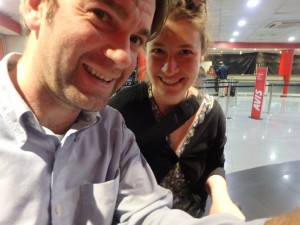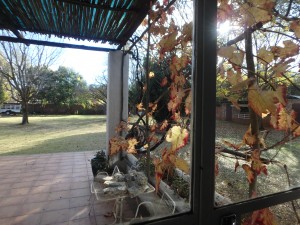June 16th. Potchefstroom.
We made it. A little difficult, but we made it.

The airport looks pretty much like an airport. But we're in Africa!
Our plane landed perfectly on time. We disembarked to find a lovely, modern, spacious, comfortable, neat airport – it is always pleasant to be reminded that the world’s worst major airports are in Queens. But the line to get through passport control was very long, and very slow-moving. In the end we did not enter the arrivals area until an hour and a half after our scheduled arrival, and our ride, Marianne’s husband, had already left, presuming we were not on the plane. Finding no one to greet us, we found ourselves a bit ill-prepared: I had Marianne’s number, yes, but only on my computer, which had no power, nor could we charge it, because we did not have the adapter, etc. So another hour passed while we changed money, got an adapter, found an outlet, got a cellphone, and called her. Her husband turned around – he had not gotten home yet – and came to get us.
Changing money I had one of those experiences which seemed just a bit different, as one does in a new country. There was a line of three customers all for one teller. There was another teller, who appeared to be working on her computer. After waiting quite a while, I went up to her and asked her if she was busy – because I began to feel that she was not – and she said no, she could help me. It seemed to me unusual that a bank teller should ignore a line of customers. In fact, until I asked, I presumed it was impossible.
Marianne’s husband Dirk picked us up in his BMW, which he drove impressively quickly over excellent superhighways around Johannesburg. The big highways, the desert air – we could have been in Phoenix, really. But then I saw a fire by the side of the road, burning up the dry grass, and not being put out. “It’s the fire season,” Dirk said simply.
We talked for the whole two hour trip, about many things. Only once really did Latin come up: he mentioned that the Afrikaans speakers were the special targets of resentment. I confirmed that the South African national airline did not use any Afrikaans at all, not even a word or two on its logo. We then spoke about the politicization of Afrikaans, how it is very specifically linked with apartheid in a way that English is not (Potchefstroom is “the Afrikaans University,” where courses are taught in Afrikaans, and there has been pressure to end this and teach only in English). I asked if Latin was also considered a mere colonial remnant.
“I don’t think so,” he said. “I don’t think there’s any politics around Latin. If you asked ninety percent of the people in South Africa what Latin is, they wouldn’t know. I think that’s the problem.”
The highway ran right around Soweto and then began to falter. It went to two lanes in each direction; then lane lines vanished; then one lane in each direction, and utterly unlit. Stop-signs appeared out of nowhere in the middle of the highway, with people standing around at the intersections.
“Marianne didn’t want you driving yourself to Potchefstroom,” Dirk explained. “It’s very dangerous, really. The country’s very dangerous. You don’t want to end up in the wrong place, not going around Soweto. There are carjackings, and real violence. It never used to be like this before 1994. I don’t quite know why it’s like this now. I guess people thought that things would change faster. You mentioned before about the rand being weak against the dollar, and for the most part we don’t think much about that. I’ve got my money in London, if my daughters need anything, I can say, ‘here, enjoy something.’ But we pretty much just let the world go its own way, and we go ours. Whatever’s going on elsewhere, things here in Africa don’t change very much.”
Now we’re here. We really haven’t seen much that would be out of place in the U.S. But it feels a bit tattered, somehow – a bit tired. We are staying in the house of a university professor, but there is no central heating, and the lights are mostly fluorescent lights. It’s cold and dim. Not only is there no wi-fi, but none of the neighbors have any either – in a comfortable residential neighborhood, my computer doesn’t pick up any signals at all. In America I would pick up twenty different signals in a neighborhood like this. As we approached Potchefstroom there were more potholes, and more darkness, and a general feeling that something was falling apart and not being repaired. This too may be part of the changelessness.

